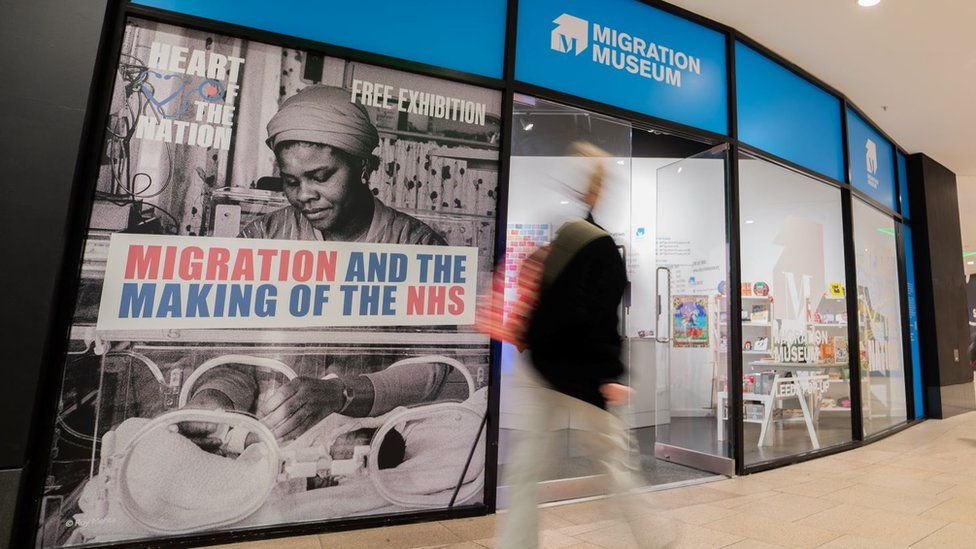Leeds migrant workers speak of pride at helping build NHS
- Published

Two women who emigrated to the UK in the 1950s and 60s to work for the NHS have spoken of their roles in helping to build the fledgling organisation.
Gloria Hanley and Josie Caulfield are among the people featured in the Migration and the Making of the NHS exhibition, now on display in Leeds,
About 265,000 of the 1.5 million NHS staff are non-British, figures show.
Organisers said the exhibition sought to recognise all employees' stories "from porters to brain surgeons".
Mrs Hanley and Mrs Caulfield both moved to England as young women to work in the health service.
Mrs Hanley, 72, grew up on the island of St Kitts, in the Caribbean, before coming to the UK in 1968.
She lived in Basingstoke and London before moving to Leeds, where she worked as a community midwife for 30 years.
She said she felt the exhibition and its focus on the treatment of migrant staff had been "a long time coming" and highlighted the racism she and many colleagues had encountered.
"We've given so much, but where's the record?" she asked.
"This museum, this exhibition, is highlighting the people who have contributed to the NHS, but are not recognised."
While the exhibition, currently based at the Migration Museum in Trinity Leeds, was soon due to move to London, Mrs Hanley said she would like part of it to remain in the city "as a legacy".
Mrs Hanley added that "without us, I daresay, the NHS would've struggled".
Josie Caulfield, 84, came to Leeds from Ireland in 1958 to pursue her dream of being a nurse.
After three months training in Harrogate, she said she was thrown into work on a male surgical ward.
"It was very primitive, when you think about today's ways of working," she said.
"Back then, everything was re-used. We boiled the syringes and needles, we spent our weekends washing bandages - and we even washed the rubber gloves."
Mrs Caulfield later moved to the A&E department where she spent 30 years before retiring in 2000.
She said she remembered there were "a lot of black and Irish nurses" when she started.
However, she said she had not experienced any discrimination personally, adding: "We got on really well together."
Asked about her role in the early days of the NHS, Mrs Caulfield said: "I feel proud I was part of it [and] I hope people will appreciate the help people from other countries gave to the health service."
Harriet Costello, from the Migration Museum, said the exhibition had been set up to "recognise the stories of all the migrants that make up the NHS".
"The NHS would not really exist from its beginning, but also still now, without migration," she said.
"We wanted to look at how so many migrants have built that up."
Ms Costello said the exhibition focused on people's stories "from porters to brain surgeons" who had come to work in the NHS.
The exhibition runs at Trinity Leeds until Sunday.
Follow BBC Yorkshire on Facebook, X (formerly Twitter) and Instagram. Send your story ideas to [email protected]
- Published5 July 2023
- Published13 July 2019